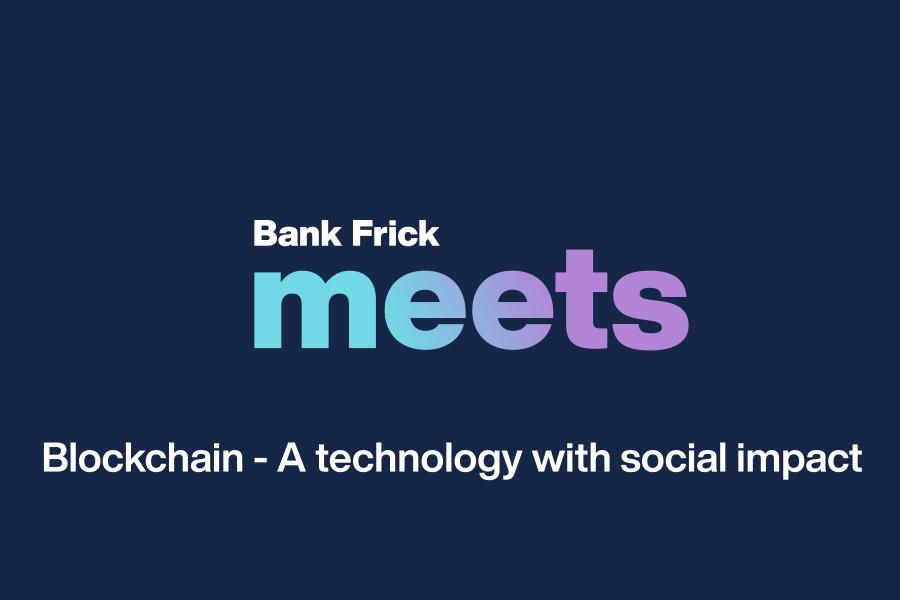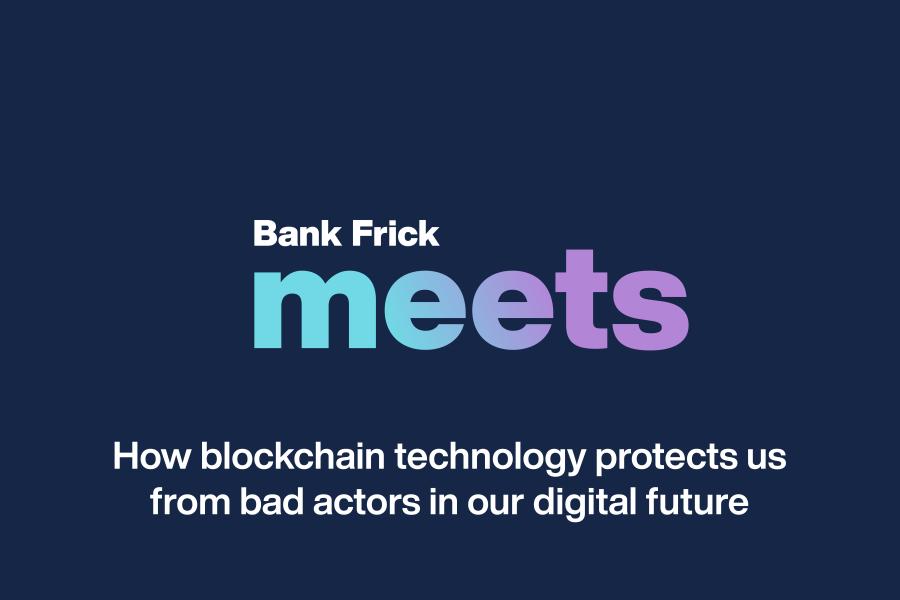The Blockchain Act: new business for the entire sector
The Blockchain Act sees Europe’s most comprehensive blockchain regulation come into effect in Liechtenstein. The Blockchain Act creates far-reaching legal certainty for the still fledgling blockchain industry and therefore plays a key role in its professionalisation. Bank Frick benefits from this development and is able to further consolidate its role as the leading blockchain bank.
As a leading bank in the field of regulated blockchain banking, Bank Frick welcomes the new Blockchain Act which has been in force since the start of the year. Liechtenstein has created Europe’s most comprehensive blockchain regulation, thereby underscoring its pioneering role in the token economy.
This positions Liechtenstein as the optimum anchor point for the blockchain industry and the burgeoning token economy. Not only does the Blockchain Act offer groundbreaking framework conditions and legal certainty, it also contributes significantly to the further professionalisation of the sector, thereby increasing trust in this new market.
Steady advances
Even before the adoption of these groundbreaking framework conditions, Bank Frick had already gained considerable expertise in blockchain banking. As a licensed universal bank, Bank Frick has applied the same strict legal standards as those used in classic banking transactions from the outset. A decisive factor here was not to look at the topic in isolation, but to build up the relevant expertise in all the critical departments: in Business Development, Client Support, Trading and – very importantly – Compliance. That’s why Bank Frick employs business and compliance specialists with proven banking and crypto experience.
In compliance with strict legal requirements, Bank Frick set up so-called cold storage for Bitcoin and Ethereum a number of years ago. The first regulated alternative investment fund (AIF) with crypto investments was approved in 2018. And, at the end of 2019, the Financial Market Authority (FMA) Liechtenstein approved the first fully regulated AIF in Europe, which enabled the issue of tokenised fund units – a huge step for Bank Frick, but above all for the blockchain sector as a whole.
Ideal framework conditions
Liechtenstein’s comprehensive legal framework conditions in the blockchain sector offer established companies, start-ups, investors and crypto exchanges the opportunity to boost their blockchain business in a secure regulatory environment. These framework conditions as well as the consulting and regulatory expertise offered by blockchain expert Bank Frick create the ideal basis for the successful implementation of business ideas and participation in the burgeoning token economy.
The Blockchain Act offers opportunities for new business
The new Blockchain Act offers ample opportunities for new business – particularly for classic stakeholders which, as of yet, are not familiar with blockchain technology and its advantages or still showing a hesitance to implement blockchain-based products. Asset managers, for instance, are now able to issue their own products in token form. For this, all they require to do is to undergo certification as a token issuer by the FMA. Bank Frick has a wealth of experience in this field and would be happy to provide its expertise.
With its one-stop-shop approach, Bank Frick supports the plans of intermediaries and offers trading and custodian services for crypto assets, supports token purchasing and develops tailored crypto structuring solutions. This makes Bank Frick the ideal point of contact when it comes to exploring the opportunities of the Blockchain Act and generating new business.
Share post

Related Posts

How Blockchain Enables Transparency and Efficiency
Blockchain technology, first demonstrated in 2010 through a historic Bitcoin transaction, has evolved far beyond cryptocurrencies, offering solutions for transparency, efficiency, and decentralization across industries. Its core principles—decentralization, transparency, and immutability—enable secure, peer-to-peer transactions without intermediaries. Innovations like Ethereum's smart contracts have expanded blockchain's capabilities, impacting supply chains, automation, and governance.
Despite concerns about energy use, modern blockchains are increasingly energy-efficient, and misconceptions about complexity or security often stem from misunderstandings. For nonprofits, blockchain offers transformative potential: donations can be transferred quickly, cost-effectively, and transparently, ensuring more funds reach beneficiaries while improving accountability and impact measurement.
As blockchain reshapes societal structures and trust, it presents nonprofits with powerful tools to amplify their impact. Organizations willing to embrace this innovation will be well-positioned to drive meaningful change in an interconnected digital world.

Insights into the process of designing AMCs
Since their introduction, Actively Managed Certificates (AMCs) have become a significant component of the European financial market. As a structured product, legally classified as debt securities, they hold a counterparty risk for the investor that is comparable with other structured financial products. AMCs are securitised, which gives the holder the right to cash repayment or the delivery of an underlying asset. As the buyer, the investor becomes a creditor of the issuer and thus dependent in terms of the type and amount of repayment, which is subject to different parameters.

Direct market access – efficient trade execution for fund strategies
Liechtenstein has a long-standing tradition in the fields of banking and asset management. Since joining the EEA in 1995, Liechtenstein’s financial centre has established itself as a professional point of reference for promoters of collective investment vehicles on the European financial market.

Ensuring the future of insurance with blockchain technology
The insurance market is an essential part of the global economy, covering both personal and business risks. Thus, it is no wonder that it is one of the largest industries in the world, boasting an estimated value of about USD 5 trillion and employing about 2.7 million people across the globe. Out of USD 5 trillion, around USD 3.7 trillion makes up the value of the global life insurance market, while the value of the property and casualty insurance market carries a value of USD 1.3 trillion.

Tokenisation: A new way of representing assets
Ever since the dawn of time, human beings have hunted and gathered, collecting the things they discovered and making them their own. This was when the concept of ownable assets first emerged, albeit in rudimentary form. Since then, assets have evolved and become more complex as humans have found more reliable ways to connect assets to people. Today, people enter into legal contracts when transferring assets.

Blockchain: A technology with social impact
Foundational technology is the most effective tool for impacting society at large and solving the challenges it is faced with. One such foundational institutional technology is the blockchain, which entered the picture through the discovery of Bitcoin in 2009 and has since proliferated and emerged in many different forms.
What does blockchain’s social impact look like?

How blockchain technology protects us from bad actors in our digital future
The blockchain industry has experienced significant growth in the last couple of years as one unicorn after another sprouts from the soil that grows crypto start-ups. In this new series of blog posts and webinars, we take a closer look at the technology and explore why it is so successful and why everybody is talking about it. We also look beyond the speculative aspect that blockchain is so frequently associated with and focus on the real-world problems that the technology is poised to solve.

Wie klassische Finanzintermediäre in der Krypto- und Blockchain-Welt Fuss fassen können
Mit zunehmender Selbstverständlichkeit fragen immer mehr Kunden nach Dienstleistungen rund um Kryptowährungen. Für Finanzintermediäre eröffnet diese Nachfrage neue Geschäftsmöglichkeiten. Um das Potenzial heben zu können, müssen die Akteure aber auch das Spezialwissen zur Verfügung haben.

Blockchain technology reinvents correspondent banking – just not yet
As one of its major use cases, blockchain technology is said to transform traditional correspondent banking. So far major challenges have pushed back this transformation. It is more likely than ever that with central bank digital currencies on the horizon; blockchain disruption will finally come to fruition in the realm of cross-border banking.

Turning crypto investment into an earning asset
With Ethereum upgrading to Proof of Stake, the crypto world is going through one of its most transformative shifts to date. This means that customers will soon be able to earn interest on their digital asset holdings through a process called staking. What staking is, how it will define the future of Ethereum and digital asset custody at large is explained in this article.